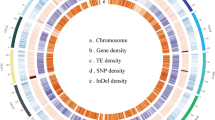Abstract
Wight and Barua1 have shown that pellucid punctations of leaves, caused by sclereids, indicate species hybrids of tea (Camellia sinensis L.). On this criterion certain cultivated tea populations popularly known as China hybrid are supposed to have had either Camellia irrawadiensis (P. K. Barua) or another similarly punctate Camellia as one possible progenitor.
This is a preview of subscription content, access via your institution
Access options
Subscribe to this journal
Receive 51 print issues and online access
$199.00 per year
only $3.90 per issue
Buy this article
- Purchase on Springer Link
- Instant access to full article PDF
Prices may be subject to local taxes which are calculated during checkout
Similar content being viewed by others
References
Wight, W., and Barua, P. K., Nature, 179, 506 (1957).
Roberts, E. A. H., Wight, W., and Wood, D. J., New Phytol. (in the press).
Kirby, K. S., Knowles, E., and White, T., J. Soc. Leather Trades Chemists, 37, 283 (1953).
Barua, P. K., Camellian, 7 (4), 18 (1956).
Author information
Authors and Affiliations
Rights and permissions
About this article
Cite this article
WOOD, D., BARUA, P. Species Hybrids of Tea. Nature 181, 1674–1675 (1958). https://doi.org/10.1038/1811674a0
Issue Date:
DOI: https://doi.org/10.1038/1811674a0
This article is cited by
-
Comparative analysis of chloroplast genomes indicated different origin for Indian tea (Camellia assamica cv TV1) as compared to Chinese tea
Scientific Reports (2021)
-
Nuclear microsatellites reveal the genetic architecture and breeding history of tea germplasm of East Africa
Tree Genetics & Genomes (2016)
-
Construction of a genetic linkage map and mapping of drought tolerance trait in Indian beveragial tea
Molecular Breeding (2015)
-
AFLP-Based Genetic Diversity Assessment of Commercially Important Tea Germplasm in India
Biochemical Genetics (2010)
-
An assessment of genetic diversity among Camellia sinensis L. (cultivated tea) and its wild relatives based on randomly amplified polymorphic DNA and organelle-specific STS
Heredity (1997)
Comments
By submitting a comment you agree to abide by our Terms and Community Guidelines. If you find something abusive or that does not comply with our terms or guidelines please flag it as inappropriate.



